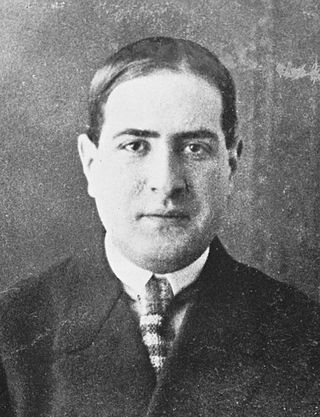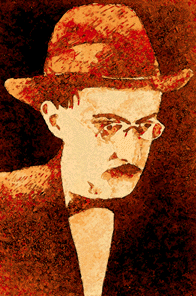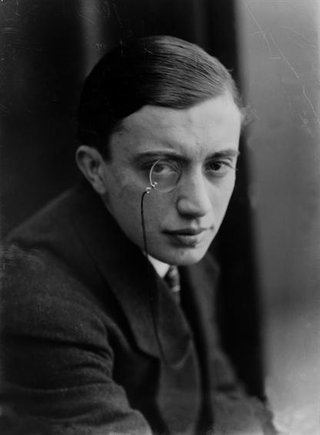
Fernando António Nogueira Pessoa was a Portuguese poet, writer, literary critic, translator, publisher, and philosopher, described as one of the most significant literary figures of the 20th century and one of the greatest poets in the Portuguese language. He also wrote in and translated from English and French.

Sophia de Mello Breyner Andresen was a Portuguese poet and writer. Her remains have been entombed in the National Pantheon since 2014.

Mário de Sá-Carneiro was a Portuguese poet and writer. He is one of the best known authors of the "Geração D'Orpheu", and is usually considered their greatest poet, after Fernando Pessoa.

Antonio Tabucchi was an Italian writer and academic who taught Portuguese language and literature at the University of Siena, Italy.

Álvaro de Campos was one of the poet Fernando Pessoa's various heteronyms, with a reputation for a powerful and angry style of writing. This alter ego is recounted to have been born in Tavira, Portugal.
The literary concept of the heteronym refers to one or more imaginary character(s) created by a writer to write in different styles. Heteronyms differ from pen names in that the latter are just false names, while the former are characters that have their own supposed physiques, biographies, and writing styles.

Cesário Verde was a 19th-century Portuguese poet. His work, while mostly ignored during his lifetime and not well known outside of the country's borders even today, is generally considered to be amongst the most important in Portuguese poetry and is widely taught in schools. This is partly due to his being championed by many other authors after his death, notably Fernando Pessoa.
Portuguese poetry refers to diverse kinds of poetic writings produced in Portuguese. The article covers historical accounts of poetry from other countries where Portuguese or variations of the language are spoken. The article covers Portuguese poetry produced from the Middle Ages to the present era.

The Geração de Orpheu or Grupo de Orfeu were a Portuguese literary movement, largely responsible for the introduction of Modernism to the arts and letters of Portugal through their tri-monthly publication, Orpheu (magazine) (1915).

António Botto was a Portuguese aesthete and lyricist poet.

The Book of Disquiet is a work by the Portuguese author Fernando Pessoa (1888–1935). Published posthumously, The Book of Disquiet is a fragmentary lifetime project, left unedited by the author, who introduced it as a "factless autobiography." The publication was credited to Bernardo Soares, one of the author's alternate writing names, which he called semi-heteronyms, and had a preface attributed to Fernando Pessoa, another alternate writing name or orthonym.

Richard Zenith is an American-Portuguese writer and translator, winner of the Pessoa Prize in 2012.
Adolfo Victor Casais Monteiro was a Portuguese essayist, poet and writer.
Afonso Dias is a Portuguese singer, musician, poet and actor. He was deputy of the Constitution Assembly of 1975/76 under the Popular Democratic Union (Portugal). In music, he was one of the founders of Grupo de Acção Cultural. He was involved in numerous presentation inside and outside Portugal, though he recorded different discs in the studio. Throughout his career, he took part in artistic shows with José Afonso, Sérgio Godinho, Francisco Fanhais, Manuel Freire, Pedro Barroso, Tino Flores, José Fanha and others, and he produced several solo studio albums. In theater, in the 1960s and the 1970s, he to part in theatrical plays with Costa Ferreira, Carmen Dolores and Rogério Paulo. He was the founder of Trupe Barlaventina - Jograis do Algarve in 1999, and performed numerous shows and made studio recordings. He worked as a director-actor and actor from 2003 with the A Companhia de Teagro de Algarve. He was member of the Associação Música XXI, which had been recording several CD collections in Selecta.

Luís de Montalvor was a pseudonym of Portuguese poet and editor Luís Filipe de Saldanha da Gama da Silva Ramos.
Persona poetry is poetry that is written from the perspective of a 'persona' that a poet creates, who is the speaker of the poem. Dramatic monologues are a type of persona poem, because "as they must create a character, necessarily create a persona".

Manuela Porto was a Portuguese actor, writer, journalist, theatre critic, and translator, as well as a leading campaigner for women's rights and an opponent of the Estado Novo dictatorship in Portugal. As a translator she introduced previously untranslated women writers to Portuguese readers, including Louisa May Alcott, Anne Bronte, Elizabeth Gaskell, and Virginia Woolf. She is also credited with popularising the work of the Portuguese poet, Fernando Pessoa.

Tripas à moda do Porto or dobrada à moda do Porto in Portuguese cuisine is a dish of beef stomach made with tripe with white beans, carrots and rice. It is considered the traditional dish of the city of Porto, in Portugal, and widely known across the entire country, where it is also simply called dobrada.

Ricardo Reis, was one of the most important heteronyms created by the Portuguese writer Fernando Pessoa.















